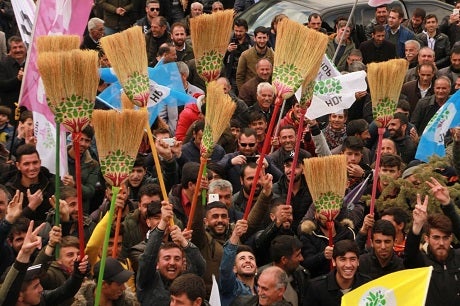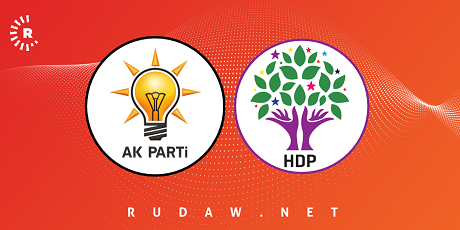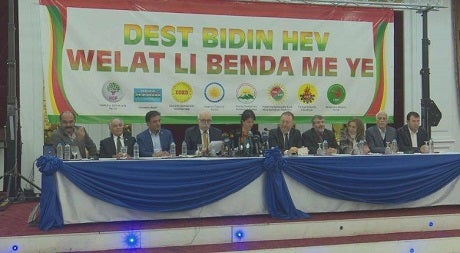With Turkey holding local elections on Sunday, every remaining minute is precious for opposition parties, which plan to join forces to try to beat President Recep Tayyip Erdogan’s Justice and Development Party (AKP) in big cities. But what is the Kurdish role? And what will they gain in return for their support of the opposition?
The pro-Kurdish Peoples’ Democratic Party (HDP) has hinted that it will vote for Erdogan’s rivals where the HDP has not fielded candidates such as large cities with millions of potential Kurdish voters. However, the party has not announced what they will receive for supporting opposition parties like the Republican People’s Party (CHP) and IYI (Good) Party.
The AKP is running former Prime Minister Binali Yildirim for the post of Istanbul mayor while the CHP has nominated Ekrem Imamoglu who was a relatively unknown until his nomination.
Brooms: HDP supports holding brooms in a rally as a sign of "sweeping" trustees in their regions in local election. Photo: HDP
Kurdish votes: HDP or AKP
Kurds in southeastern and eastern Turkey have been divided into two groups for years. One faction tends to vote for parties recommended by the outlawed Kurdistan Workers’ Party (PKK). The other, known as the conservatives, have thrown their support to the pro-Islamic AKP since its foundation in 2001.
HDP and its predecessors have denied organic links to the PKK but the latter has called on Kurds to vote specifically for the HDP and no other parties.
The AKP and HDP have held many rallies in the last two weeks in predominately-Kurdish provinces, underlying the significance for these areas for both parties. Now, most of these cities are run by AKP mayors and pro-AKP trustees who opportunistically replaced elected HDP members following the failed military coup in 2016.
The government blames the deadly coup attempt on its former ally Fethullah Gulen, who lives in self-imposed asylum in the United States.
HDP renounced the act but this did not save it from the state crackdown on dissidence, resulting in the imprisonment of thousands of HDP members and supporters including their then co-chairs Selahattin Demirtas and Figen Yuksekdag, MPs, and mayors.
“It varies from one city to another. Most of the municipalities, currently held by the HDP, will be held by the party again. However, Bitlis and Agri [provinces] are in danger. They may be won by the AKP. They are currently held by trustees. There is a strong rivalry between both, but the HDP still has the chance to maintain it,” Giresun said on Friday.
Omer Ocalan is a HDP lawmaker in Urfa (Riha). He told Rudaw English they are following a “strategy” that has “concerned” the AKP.
“The AKP and Turkish government are concerned about the HDP. We know very well that the HDP’s projects and strategy has harmed the AKP’s status and future,” he claimed.
He underestimated AKP’s capability to replace their future mayors with trustees, saying that the post state of emergency, locally known as OHAL, has taken this power away from the ruling party. The country lifted its two-year OHAL in July 2018.
Kemal Ozkiraz, the head of Avrasya Research Centre (AKAM), told Rudaw the HDP may lose votes in regions held by trustees but this will not lead to losing the cities.
“In areas mostly populated by Kurds, the HDP may lose some of its votes due to extensive social aid paid by the trustees. However, the HDP will regain all of its municipalities plus Kars,” he said on Friday.
Hilmi Dasdemir, who runs OPTIMAR Research Centre in Turkey, expressed that Kurdish people are content with trustees in Kurdish cities “but this does not mean that they will vote for them.”
Imprisoned Demirtas has called on voters to forget about the past and focus on current “electoral strategy.”
“Let’s not forget the past, what we saw and what we have experienced. But the future is more important. For a better future, I urge all of our voters to support the electoral strategy of our party,” Demirtas, a former co-chair of HDP, tweeted on Friday.
HDP ‘strategy’ for metropolises
HDP MP Ocalan claimed that his party has a “strategy” for large cities like Istanbul and Ankara.
“Everyone knows as a strategy, the HDP has not fielded candidates in metropolises so the AKP and MHP lose,” referring to Nationalist Movement Party (MHP) which signed an agreement with the AKP for the June 2018 elections and this election. Their alliance is known as People’s Alliance (Cumhur).
He admitted that they are not strong enough to win municipalities in metropolises but “we can impact on results and can decide who shall win.”
Known as Erdogan’s “Yes Man,” Yildirim has a great chance in keeping AKP reign in Istanbul but HDP growing support may harm him in Istanbul where millions of Kurds live. HDP performed well there in the June election.
Giresun from Rawest Research Centre explained that at first Kurds were “discouraged” when they knew that the HDP had refused to field candidates in metropolises. But when Erdogan denied the presence of a Kurdistan in southeastern Turkey, calling on an HDP co-chair to go to “northern Iraq” if he wants a Kurdistan, things reversed.
A seven party alliance among the pro-Kurdish party HDP and six Kurdish parties is announced. Photo: Rudaw TV
The Kurdish alliance
Seven Kurdish parties, including the HDP, joined forces in early January, giving hope for broad Kurdish unity in the country; however, the alliance has not been highlighted at HDP rallies — with few exceptions.
Giresun believes the Kurdish alliance will not boost HDP votes.
“However it has brought about a reconciliation between Kurds and the HDP,” he said, referring to wide-held beliefs that the party has been controlled by leftist Turks and it is no longer a pro-Kurdish party.
The HDP did change its policy in recent years by electing a Turkish co-chair, Sezai Temelli, and fielding thousands of Turkish leftists in recent elections. However, they justify it by saying the HDP struggles for rights of all people in Turkey and “typically Kurds.”
The other six parties allying with the HDP did not run for the parliamentary and presidential election in 2018 as they could not pass the requisite 10-percent threshold. They hope to win a few municipalities under the umbrella of the HDP-Kurdish alliance.
Another two Kurds parties, the Kurdistan Socialist Party (PSK) and Kurdistan Freedom Party (PAK), have refused to join the alliance, claiming that the HDP has not served Kurds but the government in the past. Instead they have fielded some independent candidates.
Official campaigning ends at 6 p.m. on Saturday. Polls are open from 7 a.m. to 4 p.m. in eastern areas, and from 8 a.m. to 5 p.m. elsewhere because of daylight. About 57 million people in Turkey are eligible to vote, including about 1.2 million new voters.








Comments
Rudaw moderates all comments submitted on our website. We welcome comments which are relevant to the article and encourage further discussion about the issues that matter to you. We also welcome constructive criticism about Rudaw.
To be approved for publication, however, your comments must meet our community guidelines.
We will not tolerate the following: profanity, threats, personal attacks, vulgarity, abuse (such as sexism, racism, homophobia or xenophobia), or commercial or personal promotion.
Comments that do not meet our guidelines will be rejected. Comments are not edited – they are either approved or rejected.
Post a comment